|
|
|
Sort Order |
|
|
|
Items / Page
|
|
|
|
|
|
|
| Srl | Item |
| 1 |
ID:
124098
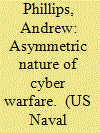

|
|
|
|
|
| Publication |
2012.
|
| Summary/Abstract |
How likely is it that a conflict between two combatants involving both kinetic and cyber operations would be an asymmetric one? And does the answer to that question depend on who the combatants are? In a kinetic scenario, the creation and "massing" of forces is often possible to observe. Whether it is the number of troops, warheads, or aircraft, one can physically monitor the activity. The buildup can be measured in days or weeks. Such a scenario involving state-of-the-art kinetic weaponry also needs a high level of expertise that only comes from years of education and training. One needs a well-funded organization to support this kind of activity.You can trace the kinetic matériel fairly accurately to its source, and the effects of a kinetic attack unfold over an observable period of time. You can watch and react to it. Defense is possible as long as you are sufficiently diligent and prepared with a response.
|
|
|
|
|
|
|
|
|
|
|
|
|
|
|
|
| 2 |
ID:
119073
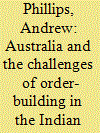

|
|
|
|
|
| Publication |
2013.
|
| Summary/Abstract |
This article considers the regional order-building challenges that Australia presently confronts in the Indian Ocean region (IOR). The author argues that while regional stability within the IOR constitutes an increasingly important Australian security interest, policy makers will struggle to translate the order-building strategies they have previously pursued in East Asia into an Indian Ocean context. In East Asia, Australia has historically pursued a 'dual track' order-building strategy centred on its participation in a US-dominated 'hub and spokes' alliance system alongside multilateral regional engagement. The absence of an equivalent alliance system or an established tradition of multilateral security diplomacy conversely precludes an extension of this strategy into the IOR. Growing tensions between the USA and China and between China and India, meanwhile, further complicate IOR security dynamics, while underscoring the urgent need for a more coherent approach to regional order-building. With these challenges in mind, the author concludes by proposing a range of bilateral, minilateral and multilateral initiatives that Australia should pursue to stimulate the emergence of a more cooperative IOR security environment.
|
|
|
|
|
|
|
|
|
|
|
|
|
|
|
|
| 3 |
ID:
145522
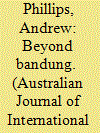

|
|
|
|
|
| Summary/Abstract |
The special issue this article opens examines the systemic impact, limits, achievements and legacies of the 1955 Asian-African ‘Bandung’ Conference. The Bandung conference is typically celebrated as a high point of Indonesian foreign policy activism and a key milestone in the emergence of the ‘Third World’. By contrast, mainstream international relations has paid comparatively less attention to its broader impact in the evolution of the modern international order. The special issue contributors here seek to correct this lacuna by interrogating Bandung’s significance in challenging, affirming and amending key aspects of the post-war global order. They also consider its relevance in setting important precedents that simultaneously foreclosed and enabled different manifestations of South–South cooperation thereafter. Beyond its historical significance, they finally explore Bandung’s enduring legacies for both domestic Indonesian order-building projects and Indo-Australian efforts to bridge the ‘Bandung divide’ in their responses to contemporary threats to international order. This article opens this inquiry by historically situating Bandung within its broader global context, unpacking its four ‘faces’ (order-challenging, order-affirming, order-building and order-transforming) and finally delineating the key axes of debate around which this special issue is organised.
|
|
|
|
|
|
|
|
|
|
|
|
|
|
|
|
| 4 |
ID:
145528
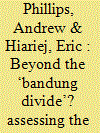

|
|
|
|
|
| Summary/Abstract |
Despite sharing many strategic interests, Indonesia and Australia have often struggled to forge effective security cooperation. In this article, the authors evaluate the ‘Bandung divide’ as a potential explanation for this difficulty. The ‘Bandung divide’ refers to the legacies of the 1955 Asian-African Conference, which saw Indonesia and Australia adopt different normative orientations towards the liberal international order, and divergent security strategies for South-East Asia. Having sketched the contours of the ‘Bandung divide’ and established its heuristic utility as a shorthand for the two countries’ divergent approaches to international order and regional security, the authors then evaluate its contemporary significance as a barrier to bilateral security cooperation in relation to two key challenges: Chinese revisionism in the South China Sea and transnational jihadist terrorism. Indonesia and Australia’s divergent approaches to regional security—themselves partially legacies of the ‘Bandung divide’—have prevented meaningful bilateral collaboration in engaging the South China Sea dispute. By contrast, the two countries have built an effective and heavily institutionalised counterterrorism partnership, proving that the ‘Bandung divide’ is not an insuperable barrier to cooperation. The highly restrictive circumstances that made this success possible nevertheless caution against unduly optimistic assumptions that the two countries will be able to forge a more comprehensive security partnership in the foreseeable future.
|
|
|
|
|
|
|
|
|
|
|
|
|
|
|
|
| 5 |
ID:
120203
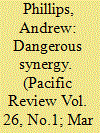

|
|
|
|
|
| Publication |
2013.
|
| Summary/Abstract |
This paper analyzes the current and prospective implications of Asia's energy consumption revolution for regional stability. Adopting a comparative and historical approach, I argue that Japanese energy security anxieties worked to reinforce regional alignment patterns in East Asia for nearly two decades following the Shanghai communiqué, thereby strengthening regional stability. Conversely, the post-Cold War period has seen in China and India's rise the emergence of Asian energy super-consumers that are not formally aligned with the United States, but that are increasingly dependent on imported energy supplies to fuel their industrialization. This newfound dependence on energy imports has seen both countries follow Japan's longstanding example in securitizing energy as a policy issue. In the context of an already more contested Asia, this trend towards energy securitization has aggravated regional tensions and will continue to do so unless greater efforts are undertaken bilaterally, regionally and globally to foster more effective forms of energy cooperation.
|
|
|
|
|
|
|
|
|
|
|
|
|
|
|
|
| 6 |
ID:
141844
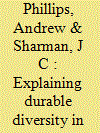

|
|
|
|
|
| Summary/Abstract |
International Relations theories generally hold that increased interaction between units in an international system produces convergence in their forms through military competition, institutional emulation, or normative socialization. In contrast, we argue that diverse international systems can endure despite increasing interaction. The early modern Indian Ocean international system hosted a variety of statist, corporate, and imperial polities. Diversity endured for three reasons. First, powerful foreign and local actors held differing maritime and land-oriented preferences for conquest, which created the potential for coexistence between unlike polities. Second, congruent European and Asian ideas of heteronomy facilitated durable polity diversity. Third, strategies of localization enhanced enmeshment. Convergence on common polity forms failed to occur despite the presence of a statist model during this period. Subsequently, a reconfigured form of diversity under colonial empires succeeded this order. Greater attention to past diverse systems coheres with recent calls to study history to better understand not only contemporary instances of international hierarchy, but also unbundled and shared sovereignty regimes.
|
|
|
|
|
|
|
|
|
|
|
|
|
|
|
|
| 7 |
ID:
145120
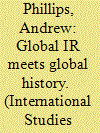

|
|
|
|
|
| Summary/Abstract |
International relations (IR) scholars commonly accept the sovereign state’s ubiquity today as the endpoint of a centuries-long process of modernization, spearheaded by European imperialism. Through this schema, European military superiority enabled Westerners to first impose themselves on non-European societies in the early modern period. The later spread of Western conceptions of national self-determination then compelled global convergence toward the sovereign state form after 1945. Conversely, I argue here that such accounts overstate the West’s margin of military superiority over non-Europeans throughout the age of empire. As a result, they also exaggerate European latitude in imposing their preferred institutional forms on conquered societies and mischaracterize the character of colonial modernity. Drawing inspiration from global history and harnessing illustrations from the Indian Ocean region, I argue that Western imperialism was critically mediated by Europeans’ alliances of convenience with indigenous partners. This dependence on local allies persisted throughout the colonial era as Western imperialists leveraged local institutions and conceptions of political legitimacy to perpetuate colonial rule. Acknowledging this reality forces us to critically revisit conventional narratives about the sovereign state system’s universalization, and to foreground hybridity over homogenization as global modernity’s master theme.
|
|
|
|
|
|
|
|
|
|
|
|
|
|
|
|
| 8 |
ID:
167190
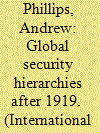

|
|
|
|
|
| Summary/Abstract |
Since 1919, world leaders have sought to uphold and advance international order by sponsoring a succession of global security hierarchies, understood as authoritative arrangements that are global in scope and dedicated to mitigating international security challenges. These hierarchies have progressively broadened in the inclusivity of their security referents. Explicitly racist and civilizational answers to the question ‘security for whom’ have given way to more cosmopolitan visions of security hierarchy. The scope of the challenges these hierarchies have aimed to mitigate (‘security from what’) has also broadened, alongside the intrusiveness of the measures (‘security through which means’) licenced to manage them. The progression towards more inclusive, ambitious and intrusive global security hierarchies has nevertheless evolved in tension with the parallel globalization of both nationalism and the sovereign state system. These countervailing influences – in conjunction with the recent worldwide resurgence of illiberal forces – now threaten the prospective longevity of today’s United Nation (UN)-centric cosmopolitan global security hierarchy.
|
|
|
|
|
|
|
|
|
|
|
|
|
|
|
|
| 9 |
ID:
113617


|
|
|
|
|
| Publication |
2012.
|
| Summary/Abstract |
Since 9/11, counter-terrorism officials have fretted over the possibility of jihadist terrorists obtaining and deploying a nuclear weapon. Although acknowledging that such anxieties are well grounded, I offer here a reconceptualisation of the jihadist terrorist nuclear threat that focuses alternatively upon the remote but real possibility that jihadist terrorists may seek to advance their goals by trying to provoke an Indo-Pakistani nuclear confrontation. Such a confrontation would serve jihadist goals by aggravating religious polarisation on the sub-continent while dramatically weakening the Pakistani state. The system-destabilising consequences of such a catastrophe would likely also offer the jihadists their best opportunity to revive their faltering movement, which otherwise appears fated to terminal decline. In the light of this assessment, I argue that a higher priority must be accorded towards strengthening Indo-Pakistani crisis stability and advancing regional reconciliation if the risk of a jihadist-provoked nuclear exchange is to be minimised.
|
|
|
|
|
|
|
|
|
|
|
|
|
|
|
|
| 10 |
ID:
086576
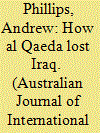

|
|
|
|
|
| Publication |
2009.
|
| Summary/Abstract |
Al Qaeda in Iraq (AQI) has suffered a grave setback in the context of its ongoing campaign there. Since late 2006 Sunni tribal militias working in conjunction with Coalition forces have decimated AQI's ranks, and the organisation has been largely expelled from its former sanctuaries in western Iraq. This article seeks to explain the causes of al Qaeda's defeat with a view towards drawing out their broader implications for the ongoing struggle against jihadist terrorism. I argue that AQI's defeat can be ascribed to its ideological inflexibility, its penchant for indiscriminate violence, and its absolute unwillingness to accommodate the sensitivities and political interests of its host communities. Furthermore, I argue that, far from being exceptional, al Qaeda's mishandling of its local allies in Iraq represents merely the latest instance of a tendency to alienate host communities that has long been evident in its involvement in conflicts in the Islamic world. My analysis confirms that al Qaeda's ideological extremism constitutes a vital point of vulnerability, and that it remains possible to pry global jihadists away from their host communities even in the context of ongoing high-intensity conflicts.
|
|
|
|
|
|
|
|
|
|
|
|
|
|
|
|
| 11 |
ID:
095601


|
|
|
|
|
| Publication |
2010.
|
| Summary/Abstract |
In the absence of comparisons with prior episodes of transformative change in the history of the state system, contemporary debates on the long-term significance of the 9/11 terror attacks and the ensuing war on terror are in danger of polarising around opposing caricatures of epochal change and obstinate durability. The tendency to organise transnationally, mobilise along religious lines, and employ terroristic violence for the purposes of achieving far-reaching religious and political transformation of target societies is not unique to Al-Qaeda, but can be seen also in the activities of the militant confessional networks that flourished in Reformation Europe. By comparing the global struggle against jihadist terrorism with early modern European rulers' struggles against transnational confessional militants, I demonstrate that existing accounts of jihadist terrorism's transformative potential have been seriously mis-specified and require substantial revision.
|
|
|
|
|
|
|
|
|
|
|
|
|
|
|
|
| 12 |
ID:
110825


|
|
|
|
|
| Publication |
2012.
|
| Summary/Abstract |
Conventional accounts of international society's expansion have traditionally emphasized the role played by 'civilizing missions' in facilitating and legitimating European aggression and imperial expansion. Conversely, in this article, I demonstrate that the relationship between imperial violence and the rhetoric of 'civilizing missions' was far more contested and contingent than International Relations scholars have generally assumed. Using the parliamentary debate surrounding Britain's involvement in the Second Opium War as a case study, I reveal that civilizational rhetoric in the 1857 'China debate' was equally implicated in both anti-imperialist and imperialist agendas. Richard Cobden's victory in the debate over Palmerston's pro-war ministry further illustrates the political potency of appeals to civilization as a brake - however temporary - on Britain's imperial expansion. An appreciation of civilization's janus-faced character - as a rhetorical commonplace that at different times abetted and inhibited imperial aggression - is therefore critical if we are to comprehend the halting and arrhythmic pattern of international society's progressive expansion under British leadership in the mid-Victorian period.
|
|
|
|
|
|
|
|
|
|
|
|
|
|
|
|
|
|
|
|
|